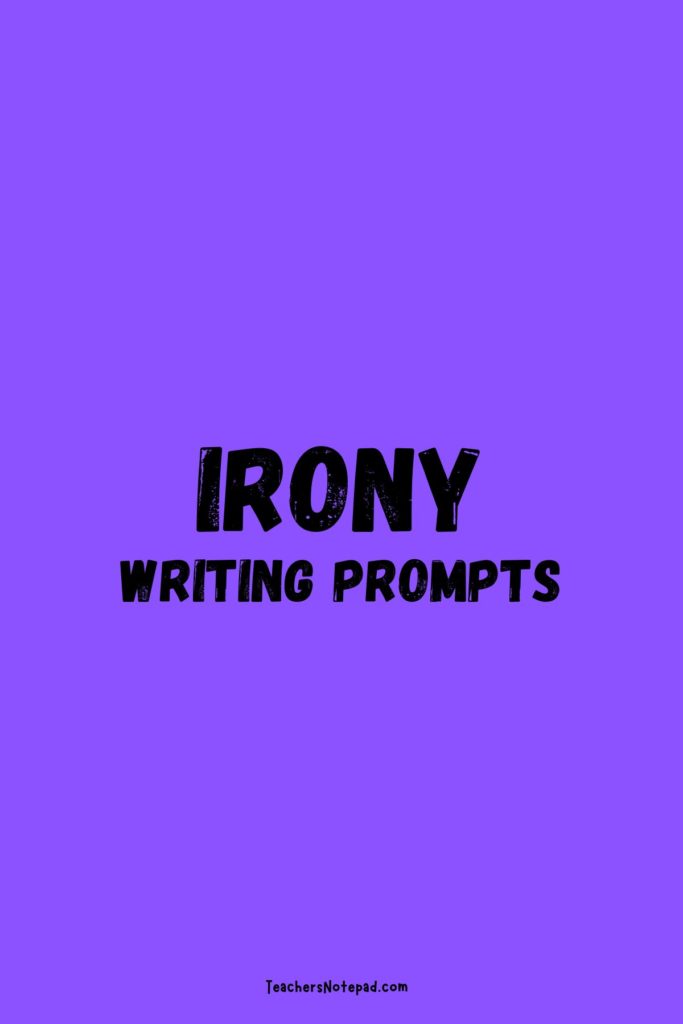Irony is a rhetorical and literary device that occurs when the outcome of a situation is different from what is expected, or when something is said that is different from what is actually happening.
Learning the difference between what people think is irony and what irony actually is, is an important step in the writing process.
We’ve put together a list of writing prompts to help your students explore the different types of irony and learn how to apply them to their storytelling.
Using This Guide
This writing guide is a tricky one because irony isn’t always easy for students to grasp right away. Here are a few ways we recommend incorporating these prompts into your lessons:
- Assign reading that involves different forms of irony, and use these prompts to gauge students’ understanding.
- Challenge students to use one prompt each day for a week.
- Have students act out verbal dialogue before tackling the dialogue assignments.
Oh, the Irony!
- Write a story where your main character and their best friend are having a disagreement but realize they actually agree in the end.
- Write five examples of verbal irony.
- How can irony be used to drive the plot of a story?
- Jerry Seinfeld once said, “If a book about failures doesn’t sell, is it a success?” What do you think?
- Tell a story about a character who has to go on a quest to return home, only to discover they had the ability to go home all along.
- Write a story using the phrase, “About as much fun as a root canal.”
- Write a story about an airline pilot who is afraid of heights.
- What is your favorite ironic saying or quote? Why?
- Tell a story using situational irony.
- Write 3-5 paragraphs about Beethoven.
- What is the difference between coincidence and irony?
- Write a story about a veterinarian who is allergic to cats.
- Write a story about a famous actor who loses their own lookalike contest.
- Tell a story about a famous chef who has to work at a fast food restaurant for a week.
- Tell a story using verbal irony.
- Write a story about a police chief who comes into the station and realizes his office has been robbed.
- You accidentally buy your teacher a mug that says “your the best teacher ever”. How does your teacher react?
- Explain the difference between irony and sarcasm.
- Tell a story about a student who keeps causing disruptions in class by shushing other students.
- Write a story about a superhero who wears his villain’s merchandise while incognito.
- Tell a story using dramatic irony.
- Tell a story about a ski trip that gets canceled because of a snowstorm.
- Write a story using the phrase “clear as mud”.
- Write five examples of dramatic irony.
- Write a dialogue between a student and a teacher using an example of verbal irony.
- Tell a story about a colorblind painter.
- Classic Disney films use irony to tell a story. Pick an example and write 3-5 paragraphs about why the irony works.
- Tell a story about a dog who eats his obedience school certificate.
- Give five examples of understatement, and use one of these examples to write a short story.
- Write a story about a man who goes to great lengths to get a car wash during a busy day, only for it to rain that night.
- Tell a story that includes a teacher telling a silent class, “Don’t all talk at once” when no one offers up an answer.
- Write a story about a student who makes a TikTok series about the ways social media is harmful to kids.
- Define Socratic irony.
- Tell a story where the main character learns what not to do by watching someone who is supposed to be teaching them something.
- Abraham Lincoln once said, “Better to remain silent and be thought a fool than to speak and to remove all doubt.” What do you think he meant by this?
- What is your favorite form of irony? Why?
- Write your own version of The Gift of the Magi.
- In the movie Elf, Buddy the Elf doesn’t realize that he’s not actually an elf, even though this is obvious to the audience. Write a story where the audience knows something the main character does not.
- Tell a story where the tiniest creature in a city is also the most important.
- Write a dialogue between two people on a bus, and use verbal irony.
- Write four examples of situational irony.
Looking For More?
We offer a wide variety of writing resources for parents and teachers.
If you are looking for something specific and can’t find it, let us know! We love hearing all of your great ideas.


